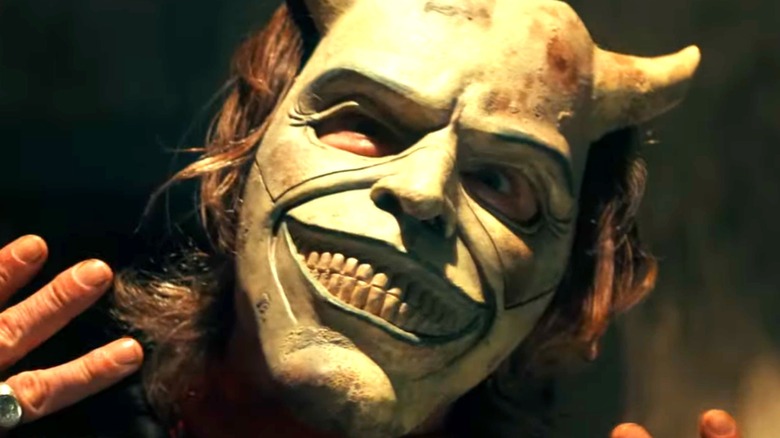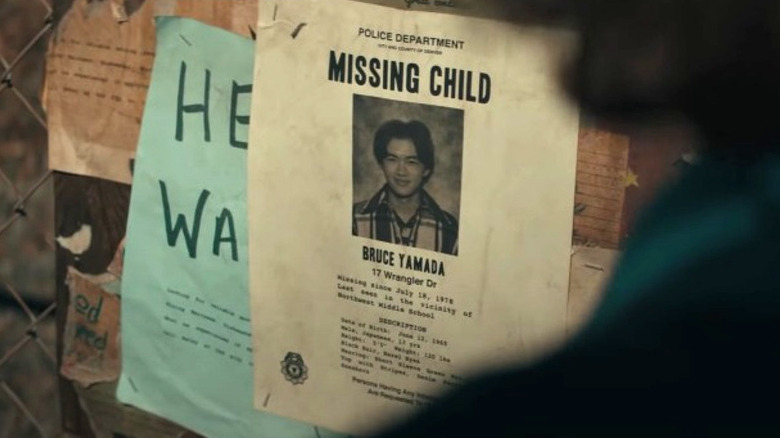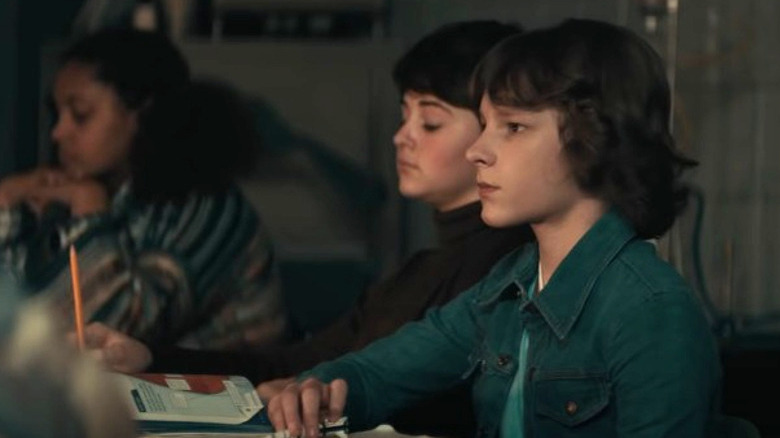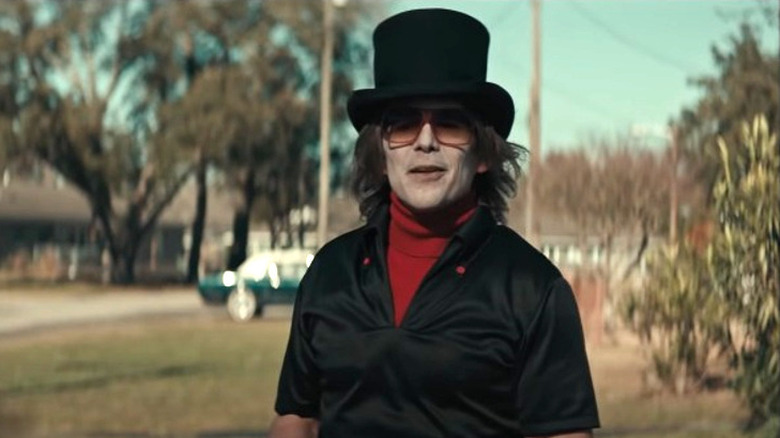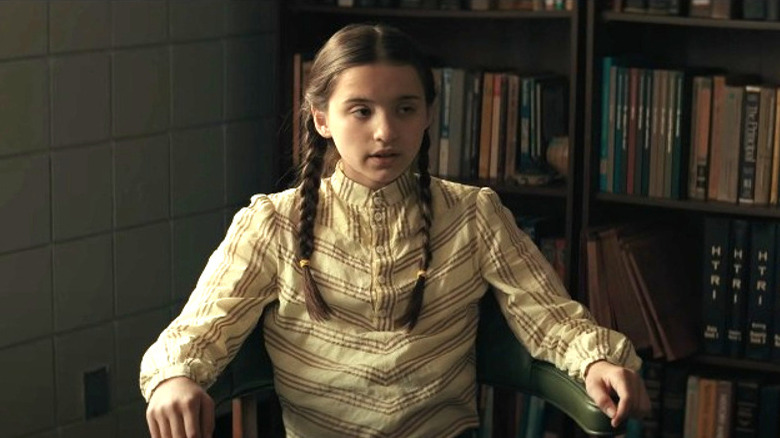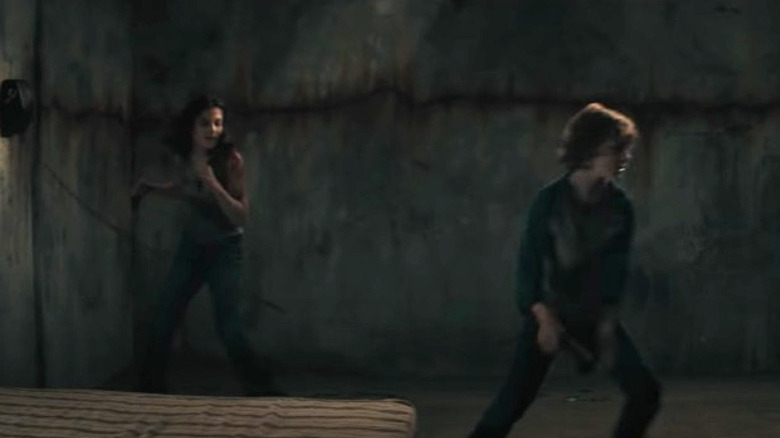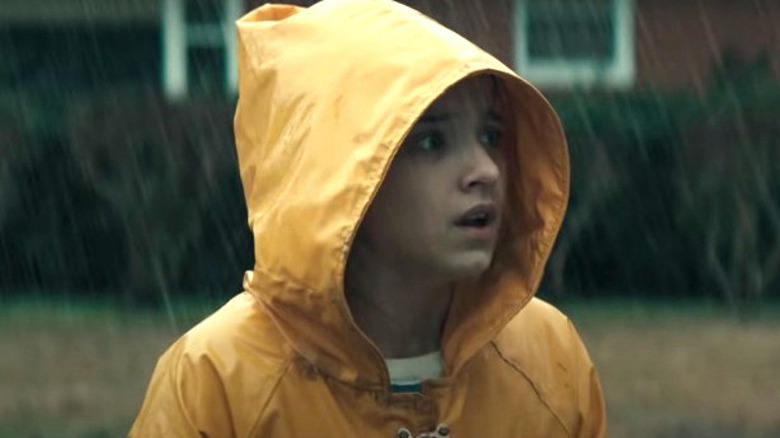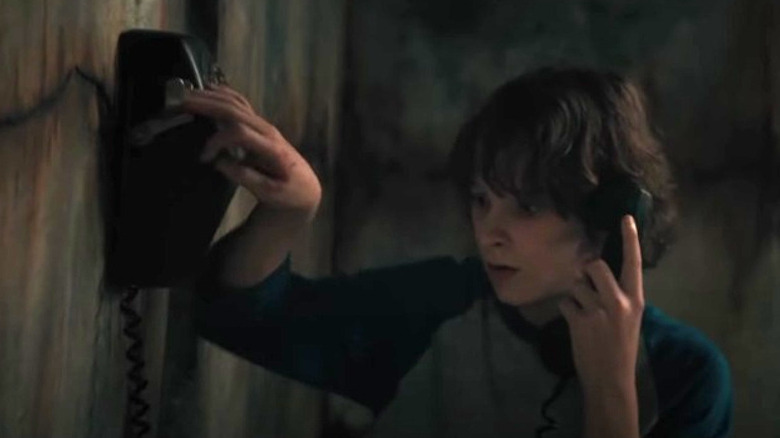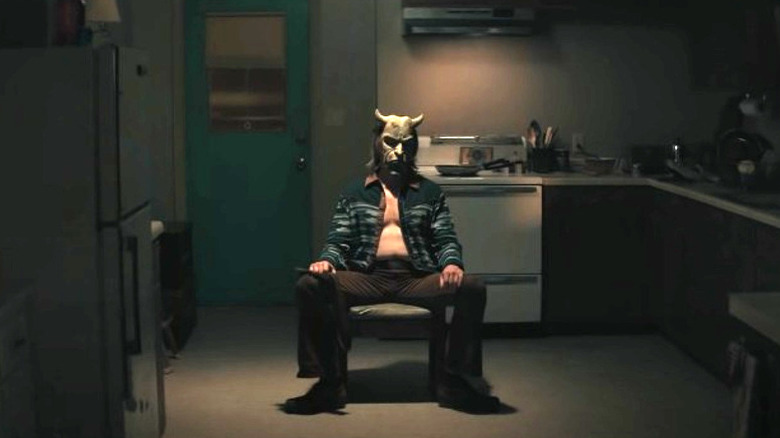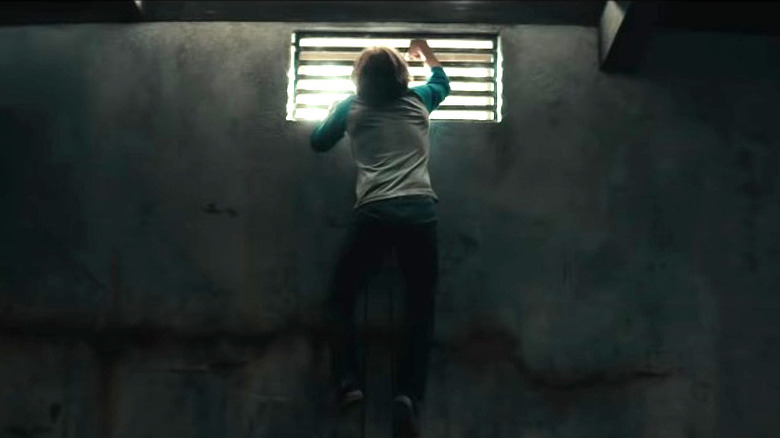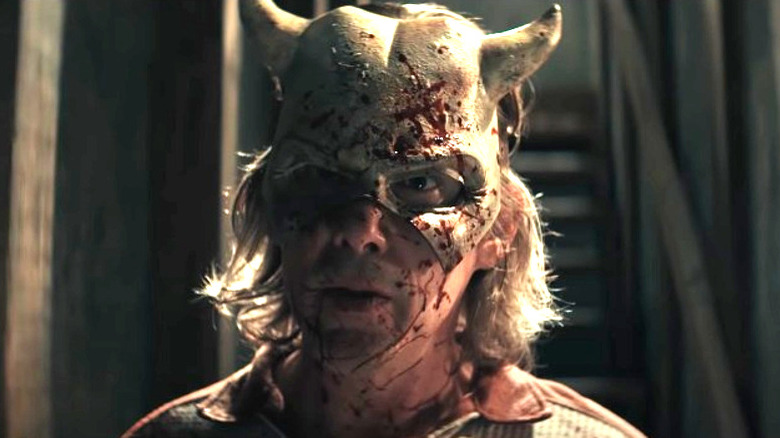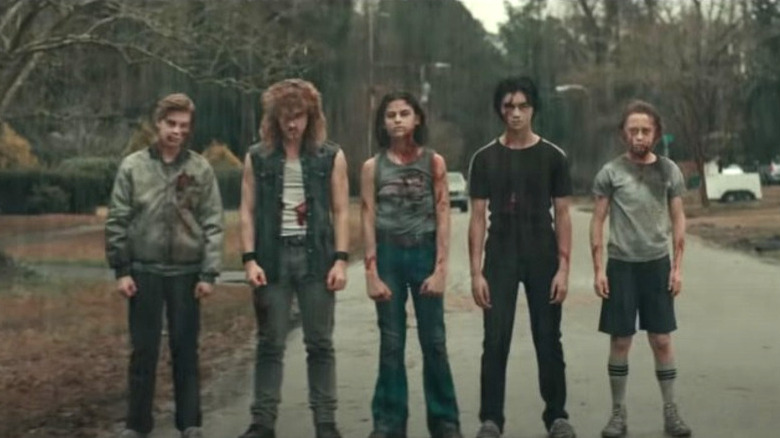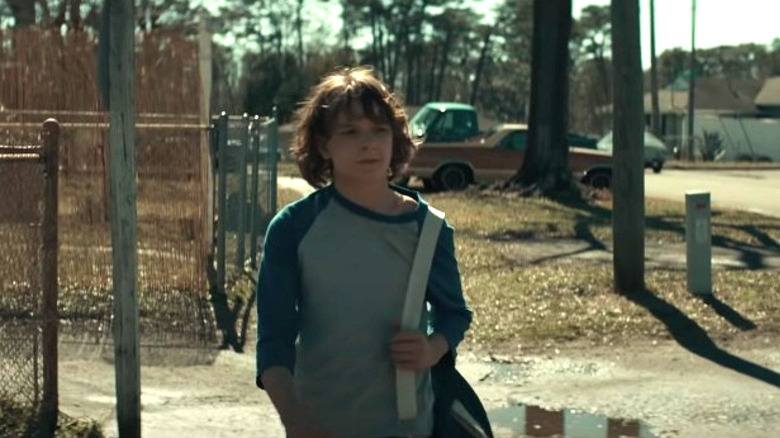The Ending Of The Black Phone Explained
"The Black Phone" is a horror movie from filmmaker Scott Derickson, who previously directed "The Exorcism of Emily Rose," "Sinister," and "Doctor Strange." Based on a short story by Joe Hill, the film is about a young kid named Finney who is captured by a deadly child snatcher dubbed "The Grabber." Trapped in the villain's soundproof basement, Finney's only hope of escaping this terrifying situation is to listen to the advice provided to him by The Grabber's previous victims via a disconnected black phone.
Although the setup and situation for the film are fairly straightforward, there are a few more moving parts than you might expect. To help make sure that everything about the ending is made clear, we will be breaking down the most important characters and moments in the film in order to provide additional context to the film's tense climax. Naturally, given the subject matter of this article, spoilers are ahead — proceed with caution.
A different time
The film wastes no time in establishing its setting: the opening shot of mountains overlooking a baseball diamond suggests these events take place in the western half of the United States. Then a chyron appears at the bottom of the screen confirming that this is Colorado. These words also let us know that the year is 1978. While this may seem trivial at first, the year is vital to understanding the events about to unfold.
This was a time when children could freely roam the streets without parental supervision and stay outside all day until the streetlights came on, yet parents were still worried about kidnappings and their children's faces popping up on milk cartons. With missing child cases like that of Etan Patz, the country was growing increasingly concerned over their children's safety but wasn't quite sure how to handle it (via The New York Times).
On top of that, there was no internet, there were no 24-hour news networks, no ring security cameras, no cell phones that could be used to track the victims or record anything suspicious. Therefore, it was a perfect environment for someone like The Grabber to operate. As long as he kept his face covered, there would be no reason to believe he would ever get caught.
Finney's arm is mint
During the baseball game, we see that our protagonist Finney is a great pitcher, and that he has a crush on a girl in the stands. He pitches two strikes before looking at his crush and getting nervous. The third pitch connects and a run is scored. Had he remained confident, his team would have won the game. Feeling down about himself, his spirits are lifted when Bruce Yamada, the player he almost struck out, compliments him by saying, "Your arm is mint," and that Finney almost had him.
Finn's confidence off the field is no better. A roaming gang of kids is champing at the bit to beat the snot out of him. His crush offers to be his lab partner, and he can barely speak to her. His father's an abusive drunk, and Finn can't work up the courage to stand up to him, even though he clearly wants to. The kid can't even watch a scary movie without wanting to scream.
The one thing he can count on, really, is his arm. This comes into play when he's in The Grabber's basement and loses all hope. He remembers what Bruce said about his arm being mint, and uses that fact to his advantage when rehearsing how to use the black phone as a weapon. With an arm as powerful as his, he could crack his kidnapper's skull if he swung hard enough.
Beware The Grabber
Local kids have been going missing for a while by the start of the movie. It's been going on so long that the media and the locals have taken to referring to the perpetrator of these crimes (played by Ethan Hawke) as "The Grabber." He rolls up in his van, grabs a kid, doses them with some kind of drug, and leaves black balloons behind. Since no one knows who he is, his reputation has grown into something akin to the boogeyman.
While walking home from school with his sister, Finn tells her to stop calling him The Grabber. At first she protests, saying that's what everyone calls him. Then she realizes what he means, and calls Finn out on being superstitious. Although not explicitly stated, it's insinuated that kids believe speaking The Grabber's name will draw his attention. The scene shows the level to which this monster has the town spooked, and further demonstrates Finney's skittishness.
He's afraid to call him The Grabber because he doesn't want to be the next one taken. Of course, Finney is indeed eventually grabbed and locked up. Perhaps, had he been a bit more confident, he would have been spared and The Grabber would've snatched someone else. It just goes to show how much courage it really took for Finney to finally fight back against his captor.
Finney's cool sister
Finn has a sister named Gwen (or Gwenny). She is, in many ways, everything Finney is not. For one thing, she's not afraid of saying "The Grabber" out loud. For another, she can take a beating and still stand her ground. While she's careful not to intentionally set off their abusive father, she isn't exactly scared of confronting him, either.
After the police question her about information she has regarding the kidnappings, her father mercilessly beats her with a belt. Instead of falling to the floor and giving in, she grabs his vodka bottle and threatens to smash it. After promising to beat her twice as hard if she carries out her threat, Gwenny lets the bottle shatter. Her dad is true to his word, but she still doesn't give in.
Also, when a group of kids starts to really wail on her brother, Gwenny shows up with a heavy rock and clocks one of the bullies across the forehead, drawing blood. She then sets in on the other boys, one of whom kicks her straight in the face. Not even that is enough for her to give up. This tells us everything we need to know about her state of mind: She won't let anyone stand in her way when it comes to defending herself and her brother.
If you or someone you know may be the victim of child abuse, please contact the Childhelp National Child Abuse Hotline at 1-800-4-A-Child (1-800-422-4453) or contact their live chat services.
Blood sends a message
There's a scene early in the movie that almost seems like a throwaway: Finney and his sister are on their way to school when they pass by a crowd of kids about to fight. One of the kids is so massive it looks like he could snap his opponent in half. However, he is facing off against Finney's friend Robin, who isn't afraid of bullies. Not only does Robin knock the big guy off his feet, he turns his face into pulp with his fists.
Later, Robin washes his bloody knuckles in the bathroom, warning anyone who messes with Finn that they're messing with him. He tells Finney he only wanted to knock the kid down but decided to draw blood because it sends a message — now, other kids know not to mess with him. We then see that Robin needs Finney to help him with some math homework. We see that these two support each other, which becomes important later.
These scenes demonstrate that Robin sees something in Finney that Finney can't see in himself. He's not just bragging to his buddy about how badly he beat some dude, he's instructing him on how to defend himself. Robin is taken by The Grabber and killed, but that doesn't stop him from looking out for his friend or teaching him how to punish a bully.
Gwenny is not like her mother
Another interesting aspect of the character of Gwenn is her dreams. As mentioned previously, the police question Gwenn about the kidnappings. Somehow, word has gotten to them that she knows about the black balloons left behind at each crime scene, a detail the police have intentionally kept out of the press. When asked how she knows about them, her answer is simple: She dreamed about them.
Every now and then, Gwenny has dreams that come true. This is kind of a problem, because her late mother also claimed to see and hear things that weren't there. Her father shouts at her that she isn't like her mother and she needs to stop talking about these dreams. He goes on to explain that Gwenny's mother started listening to the voices in her head and ended up killing herself as a result.
Gwenn trusts her instincts and follows them when trying to find her missing brother. She's seen a building where she thinks he's being kept but doesn't know where it is. When she fails to dream more answers, she has a crisis of faith, afraid she really is like her mother and suffering from a mental illness. However, by sticking to her guns and refusing to give up, she continues to seek out the truth and eventually leads the police to the house where The Grabber's bodies are buried.
If you or anyone you know is having suicidal thoughts, please call the National Suicide Prevention Lifeline at 1-800-273-TALK (8255).
The black phone
Although he doesn't know it, everything Finney needs to survive his capture by The Grabber is in the room with him. From the combination for the lock on the upstairs door, to a wire he will end up using to trip and trap the villain, he has the tools to survive his seemingly hopeless situation. On the wall beside his bed is a black phone that isn't connected to anything, but that doesn't stop it from ringing.
The nature of this phone isn't entirely clear. Instead of delving into some mystical explanation as to why the ghosts of The Grabber's victims are able to communicate through the phone, it's left up to the audience's interpretation. Is Finney really communicating with the dead? If not, how else would he know about the basement's secrets? Also, why is The Grabber able to hear the phone as well? Are they both suffering some sort of psychosis?
Where did the phone come from? Why is it still hanging up on the wall if it's so useless? None of that is important. All that matters is that Finney believes he's speaking to the dead, and he's smart enough to listen to them. It's unfortunate that at least five kids had to die so they could pass on their wisdom to him, but at least he gets to put their souls to rest.
Naughty Boy
Why does The Grabber kidnap little boys? Every now and then, his behavior suggests a sexual component to his actions, but nothing is ever made explicit. For instance, Finney wakes up to see The Grabber looking at him. Finney asks for food, but his captor says he can't feed him yet. When Finney asks why he would come down if he wasn't going to feed him, the mysterious man answers, "Just to look at you." There is unsettling awe in his voice that sends the mind racing, but the actual meaning behind his words is left vague.
Later, The Grabber considers letting Finney go. The only condition is that Finney has to tell him his name. This is a trust exercise — if Finney is honest, he might go free. We only find this out after Finney lies and The Grabber shows him the newspaper with his name and photo in it. During this scene, he mentions that the paper reveals all the lies his victims told him.
One of the ghosts tells Finney that The Grabber likes to play a game called "Naughty Boy." He wants boys to break the rules so he can beat them so hard that they pass out. Since Finney isn't playing the game, he's been able to survive. This, and his anger over Finney's lie, suggests that perhaps The Grabber suffered abuse at the hands of his own parents as a child and wishes to punish other "naughty boys" as well.
Trying everything
Finney isn't a dumb kid — he tutors Robin in math and is really into rocketry. From the start, we see that Finney keeps a small model rocketship on him at all times. He spends much of his time simulating takeoff and traveling through space, informing us that escape is always on Finney's mind — even before getting kidnapped. The rocket also serves as a weapon and a flashlight at one point.
This all demonstrates Finney's critical thinking skills. He may not be a skilled fighter, but his mind is always working. After getting trapped in that basement, he doesn't hesitate to find a way out. When a plan isn't working, he reminds himself that he shouldn't waste his time on something other victims would have already tried. When the black phone starts to ring, he not only tries each suggestion but augments them slightly to become more effective.
Tunneling in the ground, climbing out of a window with the help of a wire, breaking through the wall — none of these attempts work. Feeling helpless, he gets a call from Robin. His buddy tells him the truth: He's a great fighter. Maybe he can't throw a punch, but he always gets back up. Besides, there's one thing he hasn't tried, and his arm is mint. Under Robin's tutelage, he weighs down the phone and rehearses using his killer arm to cause maximum damage to his attacker.
Max was an idiot
The two police officers leading the investigation into the missing kids meet a strange guy named Max. While canvassing a neighborhood, they ask Max if he's seen Finney. Excited by their arrival, he invites them into the house. Turns out Max has been investigating the kidnappings as well — he has a chart and a map with pictures of the missing kids. The guy hysterically explains that The Grabber must live in the neighborhood. It's then revealed that he is staying in his brother's house, and that he has something of a cocaine problem.
Well, Max's brother is The Grabber, and Finney has been right under his feet the whole time. Had he not been so busy snorting white powder, he might have actually pieced the mystery together a lot sooner. When he finally does crack the case and finds Finney in the basement, he decides to explain how he figured out the truth rather than actually help the boy — giving his brother ample time to bury an ax in his head.
Splattered with his own brother's blood, The Grabber blames Finney for what happened. He says Max was an idiot, "But he was my idiot." Using his rage as an excuse to end Finney's life, he moves in for the final confrontation.
Out of time
As Finney is about to defend himself for the first and final time, his sister Gwenny furiously rides, looking for the house from her most recent dream. Out of nowhere, the souls of the five victims appear and point her in the right direction. She contacts the police, who show up and swarm the house. At first, they don't find anything. Then they discover the graves in the basement. They realize the killer buries his victims here but kills them elsewhere — they're in the wrong house.
This actually goes to show that this was never about saving Finn, not really. Early on, the voice of Bruce tells Finney, "I'm glad it's you," and the ghost of a tough kid named Vance uses colorful language to say they're only helping Finney in order to kill The Grabber so they can get justice. Which they do, thanks to Finney utilizing the wire to trip The Grabber into the hole he dug in the floor to trap him.
Then, he uses the phone to bash the guy's face, and the cord to strangle him. The phone rings one last time, and the spirits of the victims taunt their murderer just before Finney snaps his neck. Using some steaks he found in the fridge on the opposite side of the wall he tried tunneling through earlier, Finney distracts The Grabber's dog and heads outside to freedom — directly across the street from Gwenny and the police.
Call me Finn
So, The Grabber owned two houses. One was his residence, which he was temporarily sharing with his brother. This is where he trapped and killed the children he kidnapped. Across the street, he owned a second house in secret. That's the house where he buried the bodies. Again, this was the 1970s, and chances are he would have been able to move between the two houses without being noticed, since there were no neighborhood security cameras capturing every movement.
Not only has Finney escaped death, but he's also gotten justice for the souls of the poor kids who weren't so lucky. His dad realizes how terrible he's been and apologizes, hinting that domestic life in their household is about to change for the better. Safe and sound, he returns to school. Now, things are different. Finney isn't afraid of anyone — in fact, kids part to make way for him.
Feeling confident, he takes his seat. His crush sits next to him and says, "Hi, Finney." This is the girl who made him so nervous that he screwed up the final pitch at his baseball game, the same girl he couldn't bear to speak to without fumbling over his words. However, at this moment, he isn't afraid at all. He simply smiles and tells her, "Call me Finn."
